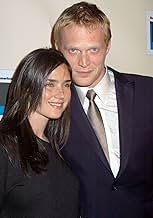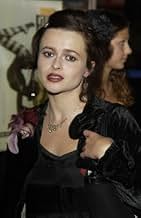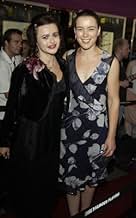IMDb RATING
6.5/10
2.8K
YOUR RATING
1930's London. Two sisters - Madeleine and Dinah - One marries Rickie, the other falls in love with him. He begins an affair which is to have repercussions throughout their lives.1930's London. Two sisters - Madeleine and Dinah - One marries Rickie, the other falls in love with him. He begins an affair which is to have repercussions throughout their lives.1930's London. Two sisters - Madeleine and Dinah - One marries Rickie, the other falls in love with him. He begins an affair which is to have repercussions throughout their lives.
- Director
- Writers
- Stars
- Awards
- 3 wins & 1 nomination total
- Director
- Writers
- All cast & crew
- Production, box office & more at IMDbPro
Featured reviews
The soul of this film is in the empathy, or it would be easy to judge. Men tend to marry women who think like themselves, but there is that darker side, different from themselves, that some men cannot resist. In the usual case, at least as far as movie plots are concerned, his darker side will drive him to find some lover that is everything that he is not. If he is obsessive, she will be moody and impulsive, otherwise she will be the Eros to his Thanatos. The wife and the lover seldom know each other. In this case, however, he finds both of these women as sisters, adding incest to the convoluted plot. The one he marries is structured like himself, but then he falls in love, or lust, with the other, a neurotic Bohemian whose child-like passions rob him of reason.
There is a fatalistic element to this plot, however. All three characters, while seemingly driven by their feelings, are actually so out of touch with their feelings that they act without reason. We say that it is their "feelings" that are driving their actions, when in fact it is their lack of "reason" that is driving their actions. They are just letting themselves feel without thinking, as though it was "fate" that made such decisions. They can't help themselves. Fate has determined that he will marry the wrong sister, and fate has determined that he will become hopelessly obsessed by the other. What is left for the audience, therefore, is to empathize with their dilemma as presented, and agree without doubt that where matters of love are concerned, there is no room for reason.
What a pessimistic and lugubrious theme! Feelings, passions and emotions, are wonderful and inspiring forces, that can drive us to the heights of ambition, or drag us down to depression, bigotry and resentment. Unless measured by reason they are worthless and potentially harmful. It is "reason" that makes feelings supreme, not just feelings alone. Wallowing in passion without reason only results in self-indulgence and destruction, as evidenced by this film. The events of this story did not "just happen" to these characters as though by fate. Not only is there "room" for reason in matters where love is concerned, but without it love becomes a trap, a disease, and a tragedy. What is missing from this story is not love, but reason.
There is a fatalistic element to this plot, however. All three characters, while seemingly driven by their feelings, are actually so out of touch with their feelings that they act without reason. We say that it is their "feelings" that are driving their actions, when in fact it is their lack of "reason" that is driving their actions. They are just letting themselves feel without thinking, as though it was "fate" that made such decisions. They can't help themselves. Fate has determined that he will marry the wrong sister, and fate has determined that he will become hopelessly obsessed by the other. What is left for the audience, therefore, is to empathize with their dilemma as presented, and agree without doubt that where matters of love are concerned, there is no room for reason.
What a pessimistic and lugubrious theme! Feelings, passions and emotions, are wonderful and inspiring forces, that can drive us to the heights of ambition, or drag us down to depression, bigotry and resentment. Unless measured by reason they are worthless and potentially harmful. It is "reason" that makes feelings supreme, not just feelings alone. Wallowing in passion without reason only results in self-indulgence and destruction, as evidenced by this film. The events of this story did not "just happen" to these characters as though by fate. Not only is there "room" for reason in matters where love is concerned, but without it love becomes a trap, a disease, and a tragedy. What is missing from this story is not love, but reason.
`The Heart of Me' is pure, unadulterated soap opera redeemed by the kind of high-toned, stiff-upper-lip seriousness of which the British seem uniquely capable. Set primarily in the 1930's, the film tells the story of two sisters caught in a passionate and quasi-incestuous love triangle. Madeline (Olivia Williams), the older of the two, is an uptight woman whose weak-willed husband, Rickie (Paul Bettany), falls in love with her younger and more free-spirited sibling, Dinah (Helena Bonham Carter). These two in-laws, soul mates for life, carry on a torrid love affair until Madeline discovers the truth and even for a time thereafter.
Given the material, `The Heart of Me' could easily have devolved into a cheap, sensationalistic melodrama for the `Masterpiece Theatre' set. Instead, thanks to truly brilliant performances by the three principal actors and an intelligent, thoughtful screenplay, the film becomes a wholly absorbing drama that offers profound insights into the realities of the human heart. The pain each of these people experiences is so palpable in its intensity that it washes away all traces of artificiality and contrivance. The film becomes a fascinating study of what happens when clanging passions are hemmed in by the restrictions and proprieties of a strict, morally repressive upper class society. Rickie and Dinah choose to turn themselves into social pariahs, then must face the consequences of their convention-defying actions. Of most interest is the emotionally complex relationship between the two very different sisters. What makes the film special is the way in which it allows the seemingly cold-hearted Madeline to become as much a sympathetic figure as the two impassioned lovers. Thanks to Williams' impeccable performance (she played Penelope in the TV movie version of `The Odyssey'), Madeline is allowed to live and breathe and have her own say, making her, in many ways, the most intriguing of the three main characters.
`The Heart of Me,' which is beautifully detailed in costumes and settings, transcends the limits of its genre to deliver a heartbreaking tale of love, loss, lament - and hope.
Given the material, `The Heart of Me' could easily have devolved into a cheap, sensationalistic melodrama for the `Masterpiece Theatre' set. Instead, thanks to truly brilliant performances by the three principal actors and an intelligent, thoughtful screenplay, the film becomes a wholly absorbing drama that offers profound insights into the realities of the human heart. The pain each of these people experiences is so palpable in its intensity that it washes away all traces of artificiality and contrivance. The film becomes a fascinating study of what happens when clanging passions are hemmed in by the restrictions and proprieties of a strict, morally repressive upper class society. Rickie and Dinah choose to turn themselves into social pariahs, then must face the consequences of their convention-defying actions. Of most interest is the emotionally complex relationship between the two very different sisters. What makes the film special is the way in which it allows the seemingly cold-hearted Madeline to become as much a sympathetic figure as the two impassioned lovers. Thanks to Williams' impeccable performance (she played Penelope in the TV movie version of `The Odyssey'), Madeline is allowed to live and breathe and have her own say, making her, in many ways, the most intriguing of the three main characters.
`The Heart of Me,' which is beautifully detailed in costumes and settings, transcends the limits of its genre to deliver a heartbreaking tale of love, loss, lament - and hope.
Watchable but unsatisfying period piece, mistakenly listed on Amazon Prime as a current film; actually it's from 2002. Based on novelist Rosamond Lehmann's The Echoing Grove, which in turn was based on Lehmann's nine-year affair with poet Cecil Day-Lewis (father of Daniel). IRL Day-Lewis dumped both Lehmann and his wife and took up with actress Jill Balcon (mother of Daniel), which might've made a more interesting movie.
On-the-nose casting of Olivia Williams as the straitlaced, conventional sister and Helena Bonham-Carter as the unstable, bohemian sister ensures the best possible outcome for the creaky plot. Nice to see Elinor Bron (Dudley's Moore's unrequited crush in the original Bedazzled) again as the sisters' interfering mother. Paul Bettany does his best with the thankless role of the sisters' wavering husband/lover; the fact that he's so easily bamboozled by his mother-in-law suggests that Lehmann came away from all this with a poor opinion of C. Day-Lewis, which certainly seems understandable.
On-the-nose casting of Olivia Williams as the straitlaced, conventional sister and Helena Bonham-Carter as the unstable, bohemian sister ensures the best possible outcome for the creaky plot. Nice to see Elinor Bron (Dudley's Moore's unrequited crush in the original Bedazzled) again as the sisters' interfering mother. Paul Bettany does his best with the thankless role of the sisters' wavering husband/lover; the fact that he's so easily bamboozled by his mother-in-law suggests that Lehmann came away from all this with a poor opinion of C. Day-Lewis, which certainly seems understandable.
6=G=
"The Heart of Me" is an excellent film in all respects except one. The pathos soaked story, which moves like a lavalamp, shows us nothing new and does it such a way we are not the least inclined to care. The film traces the life of two English sisters who have a man in common. One is his wife amd the other his mistress. A painfully tedious and stilted film which presents us with such a mawkish protag (Bettany) he can't pick one or the other or manage either much less both. Rather, he lets them manage him resulting in one really whipped dude and a whole lot of crying while we sit watching disconnected and detached. A melancholy affair, "The Heart of Me" is a very pretty flop. (C+)
A movie full of dramatic irony and beauty. I love Helena Bonham Carter and Paul Bettany. On screen, the characters are so believable that I forget that I am watching a movie. I'm transported to this world of war and snobbery, kite flying and poetry. And every twist in the plot basically rips my heart out or sends it soaring. It's so different from any other romance film that I've ever seen. The premise is familiar, but it's beautifully done. Definitely worth seeing. Keep a box of tissues nearby. This movie made me want to read more William Blake. Watch it, and you'll see why. Seriously. It is a film that grips the heart, wraps up the senses, and causes emotions to boil. Despite the poetry in the film, it is mainly a movie of action, of eyes, beautiful, intense eyes. See this movie.
Did you know
- TriviaThe poem read by Dinah (Helena Bonham Carter) in the park is Broken Love, written by William Blake.
- GoofsAll entries contain spoilers
- Crazy creditsThanks to the residents of Fitzroy Square.
- SoundtracksThe Very Thought of You
Written by Ray Noble
Performed by Al Bowlly with Ray Noble and His Orchestra
Published by Campbell Connelly & Co., Ltd.
By arrangement with Past Perfect Vintage Music
- How long is The Heart of Me?Powered by Alexa
Details
Box office
- Budget
- $7,000,000 (estimated)
- Gross US & Canada
- $196,067
- Opening weekend US & Canada
- $21,956
- Jun 15, 2003
- Gross worldwide
- $282,519
- Runtime
- 1h 36m(96 min)
- Color
- Sound mix
- Aspect ratio
- 1.85 : 1
Contribute to this page
Suggest an edit or add missing content





































